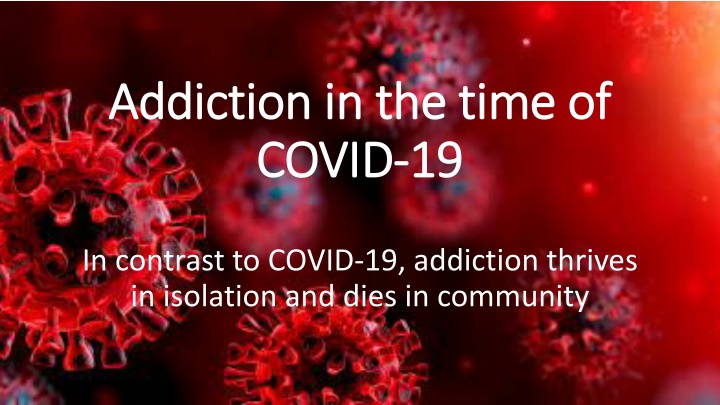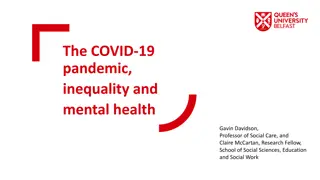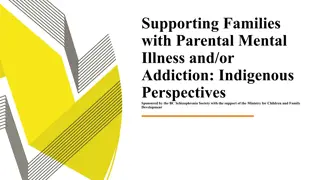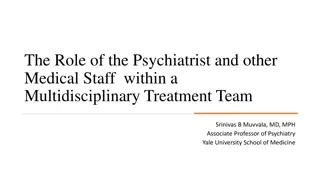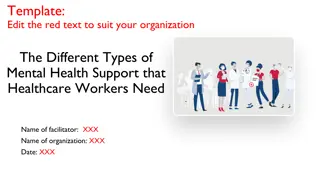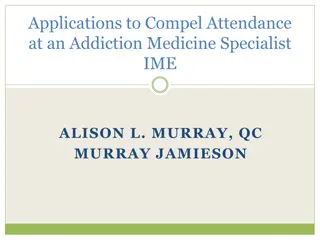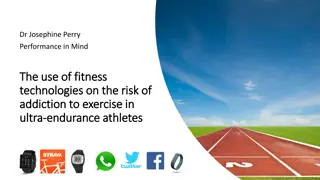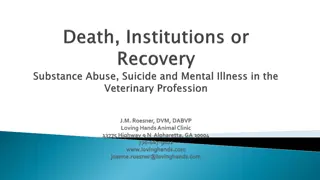Impact of COVID-19 on Addiction and Mental Health
The COVID-19 pandemic has brought challenges for individuals struggling with addiction, exacerbating issues such as anxiety, loneliness, and lack of support. Social media messages normalizing alcohol use as a coping mechanism have added to the concerns. Despite a focus on mental health in media, addiction continues to be stigmatized, affecting how individuals are perceived and supported during these challenging times.
Download Presentation

Please find below an Image/Link to download the presentation.
The content on the website is provided AS IS for your information and personal use only. It may not be sold, licensed, or shared on other websites without obtaining consent from the author.If you encounter any issues during the download, it is possible that the publisher has removed the file from their server.
You are allowed to download the files provided on this website for personal or commercial use, subject to the condition that they are used lawfully. All files are the property of their respective owners.
The content on the website is provided AS IS for your information and personal use only. It may not be sold, licensed, or shared on other websites without obtaining consent from the author.
E N D
Presentation Transcript
Addiction in the time of Addiction in the time of COVID COVID- -19 19 In contrast to COVID-19, addiction thrives in isolation and dies in community
How COVID-19 Affects Those Struggling With Addiction With the threat of COVID-19, a person with addiction may face: Anxiety over employment, finances, housing, food security Loneliness and isolation increased by the need for social distancing and being advised to stay home as well as work from home Loss of recovery support and addiction treatment systems Stress over finances, child care, home schooling, etc. Decrease in immune system health related to alcohol and/or drug use and the potential for increased susceptibility to COVID-19 infection.
Social media is full of messages normalizing alcohol as a coping tool.
And when you search for images of media mental health covid, you get quite a response about healthy ways to cope.
Do the same with media addiction covid and, well, not so much
And media alcoholism covid is even worse. So, it makes sense that sales of alcoholic beverages in the United States have increased 55% compared to this time last year.
Media and social media are demonstrating quite a response for mental health concerns at this time but the trend seems to be to make a joke out of the disease of addiction. It s not surprising, really when you look at the research. In a 2013 study, theauthors overwhelmingly found that Americans hold more negative attitudes towards persons with drug addiction than towards persons with mental illness. Addiction Mental Illness Opposed equal insurance benefits 43% 21% Employers should be able to deny employment 64% 24% Landlords should be able to deny housing 54% 15%
Here in the Northwest, KPNW patients are relapsing due to effects of the pandemic. Some examples taken from chart notes in the past month: 40 yrs female states she resumed drinking. Thinks the stressors of COVID are playing a role in her drinking. Began drinking from boredom, stressors. Drinking has been worse since laid off d/t COVID19 If I'm left to my own devices I can't control myself. Isolation is a big hard thing for me." Stated that alcohol use has increased with lack of work structure. Patient has been drinking alcohol more throughout day, and eating less. He can go through a 12 pack of beer while watching TV and not even realize he is drink that much. Is under a lot of stress with his job because of COVID-19. Patient indicates that he has fully returned to drinking. He says that happened on the 23rd of April, approximately seven days ago, when things happened at work. She has recently been furloughed from her job as a bartender. Patient has started drinking excessively, up to 2-3 bottles of wine a night. Previous to COVID she denies hx of drinking to excess. He has had trouble keeping busy due to COVID and has been spending a lot of time in his garage, "where it all happens" and drinking more. Hasn't worked for 3 weeks, went 42 days w/o ETOH, started drinking 3 weeks ago, coping with alcohol It is not surprising , then, that Addiction Medicine is filling more appointment slots post-COVID than pre-COVID.
Alcohol Use, Misuse, Addiction and Deaths are Rising A 2020 National Institute on Alcohol Abuse and Alcoholism (NIAAA), study found that: between 1999 and 2017nearly 1 million people died from alcohol-related causes (more than twice the opioid related deaths) the number of death certificates mentioning alcohol more than doubled, from 35,914 to 72,558 rates of death involving alcohol increased more for women (85%) than men (35%) over the study period A 2017 JAMA article showed that: more Americans are drinking alcohol, and a growing number of them are drinking to a point that's dangerous or harmful high-risk drinking rose overall by 30%. Among women, it rose 58% and among the elderly, it rose 65% alcohol use disorder increased by nearly 50% overall, 84% among women, 93% for African-Americans, 66% for the poor and more than doubled for the elderly.
The Importance of Screening and Brief Intervention for Alcohol Misuse The National Commission on Prevention Priorities ranked it 4th highest out of 28 common evidence based interventions in terms of the impact on health and cost effectiveness. Services (Short Name) Description CPB CE Total Childhood immunization series ACIP childhood immunization series 5 5 10 Provide interventions to prevent initiation, including education or brief counseling Screen adults for tobacco use and provide brief cessation counseling and pharmacotherapy Tobacco use, brief prevention counseling, youth 5 5 10 Tobacco use screening and brief counseling, adults 5 5 10 Alcohol misuse screening and brief intervention Screen adults misuse and provide brief counseling to reduce alcohol use 3 5 8 Low-dose aspirin use for primary prevention of CVD in adults ages 50 59 y with 10%, 10-y CVD risk and other factors Aspirin chemoprevention for those at higher risk of CVD 3 5 8 Cervical cancer screening Screen for cervical cancer in women aged 21 to 65 y with cytology every 3 y 4 4 8 Colorectal cancer screening Screen adults aged 50 75 y routinely 4 4 8 Screen for chlamydia and gonorrhea in sexually active women aged 24 y, and in older women at increased risk for infection Chlamydia and gonorrhea screening 3 4 7 Screen routinely for lipid disorders men aged >35 y, and screen younger men and women of all ages who are at increased risk of CHD. Treat with lipid-lowering medications Measure blood pressure routinely in all adults and treat with antihypertensive medication to prevent the incidence of CVD Cholesterol screening 4 3 7 Hypertension screening 4 3 7
Summary Summary Addiction patients at increased risk due to the pandemic. Social media is barraging our membership with messages that promote drinking as an acceptable response to COVID. There is a greater stigma for patients with addiction than mental health KPNW members in recovery are relapsing due to conditions unique to COVID. In the NW, there has been an increase in younger patients requiring detox for alcohol Demand is increasing and the surge is expected to last for several years. Universal screening and brief interventions for alcohol have a tremendous impact on health and healthcare costs, especially when done within primary care settings integrated with specialty addiction treatment services.
Our Request Our Request Get the Word Out Get the Word Out Use the Kaiser Permanente platform in the community to raise awareness and counter the message that alcohol is an acceptable coping tool. Reinforce NIAAA recommendations for low risk drinking Warn of increased risk of alcohol misuse during time of social distancing Warn of increased risk of relapse during time of social distancing Prioritize screening and brief interventions regarding alcohol use in Primary Care, ER and UCC. Also, have primary care teams reach out to patients that they know are in recovery to provide support. Let patients and providers know that KPNW continues to provide the highest quality addiction treatment with same day access for most services. All 80 outpatient groups have been converted to virtual, as have all medical staff services. Inpatient detox and residential remain open and an additional virtual service of Brookside From Home for those too much at risk for the inpatient environment.
